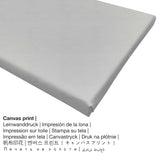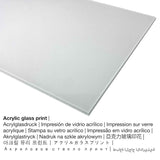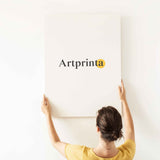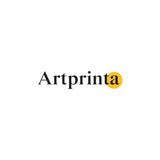Andreas Schelfhout, 1844 - View of Haarlem - fine art print
Taxes incluses. Frais de port calculés au paiement.
Product data
This more than 170 years old masterpiece was painted by Andreas Schelfhout. The work of art is in the the digital art collection of Rijksmuseum, which is the largest museum for Dutch art and history from the Middle Ages to the present day. We are pleased to state that the artwork, which belongs to the public domain is provided with courtesy of Rijksmuseum.Creditline of the artwork: . The alignment is in landscape format with a ratio of 4 : 3, meaning that the length is 33% longer than the width. The painter Andreas Schelfhout was an artist, whose artistic style can be attributed mainly to Impressionism. The artist was born in 1787 in Hague, The, South Holland, Netherlands and died at the age of 83 in the year 1870 in Hague, The, South Holland, Netherlands.
The material choices
In the dropdown selection next to the product offering you can pick the size and material of your choice. You can choose your favorite material and size among the following options:
- Metal (aluminium dibond print): An Aluminium Dibond print is a material with an outstanding effect of depth. The non-reflective surface structure make a contemporary impression. The Aluminium Dibond Print is the perfect introduction to art reproductions produced on aluminum. For our Print On Aluminum Dibond, we print the favorite artwork right onto the aluminium composite white-primed surface. The white and bright sections of the artpiece shimmer with a silk gloss but without the glare.
- Printed acrylic glass (with real glass coating on top): An acrylic glass print, often referenced as a print on plexiglass, transforms an artwork into magnificient wall décor. Besides, the acrylic glass print forms a good alternative to dibond or canvas prints. The work of art will be made with modern UV print technology. Our acrylic glass protects your chosen fine art print against light and heat for many decades.
- Poster print (canvas material): A poster print is a UV printed canvas paper with a nice structure on the surface. The print poster is qualified for putting the art replica using a special frame. Please bear in mind, that depending on the absolute size of the poster we add a white margin 2-6cm around the artwork to facilitate the framing with your custom frame.
- Canvas: The printed canvas, which should not be confused with a canvas painting, is a digital image printed on a UV direct printing machine. The canvas makes a lovely and pleasing atmosphere. The great advantage of canvas prints is that they are relatively low in weight, which means that it is easy and straightforward to hang the Canvas print without the use of additional wall-mounts. That is why, canvas prints are suitable for all types of walls.
Disclaimer: We try everythig possible in order to describe the art products as accurate as possible and to exhibit them visually on the different product detail pages. Still, the pigments of the print products, as well as the print result can differ to a certain extent from the presentation on the device's monitor. Depending on your settings of your screen and the quality of the surface, color pigments may not be printed as realistically as the digital version depicted here. Since the fine art prints are processed and printed by hand, there may also be slight differences in the motif's exact position and the size.
About the item
| Print prodct: | fine art print |
| Reproduction method: | digital reproduction |
| Manufacturing process: | UV direct printing (digital print) |
| Manufacturing: | produced in Germany |
| Type of stock: | on demand production |
| Intended product usage: | gallery wall, art collection (reproductions) |
| Image orientation: | landscape format |
| Image ratio: | 4 : 3 - (length : width) |
| Image aspect ratio interpretation: | the length is 33% longer than the width |
| Available product materials: | canvas print, acrylic glass print (with real glass coating), metal print (aluminium dibond), poster print (canvas paper) |
| Canvas on stretcher frame (canvas print) size options: | 40x30cm - 16x12", 80x60cm - 31x24", 120x90cm - 47x35", 160x120cm - 63x47" |
| Acrylic glass print (with real glass coating): | 40x30cm - 16x12", 80x60cm - 31x24", 120x90cm - 47x35", 160x120cm - 63x47" |
| Poster print (canvas paper): | 40x30cm - 16x12", 80x60cm - 31x24", 120x90cm - 47x35" |
| Aluminium print size variants: | 40x30cm - 16x12", 80x60cm - 31x24", 120x90cm - 47x35" |
| Framing of the art copy: | not included |
Structured artwork details
| Piece of art title: | "View of Haarlem" |
| Artwork categorization: | painting |
| General category: | modern art |
| Time: | 19th century |
| Created in: | 1844 |
| Age of artwork: | around 170 years old |
| Museum / location: | Rijksmuseum |
| Location of the museum: | Amsterdam, Netherlands |
| Museum's web page: | Rijksmuseum |
| Artwork license: | public domain |
| Courtesy of: | Rijksmuseum |
General information on the artist
| Artist: | Andreas Schelfhout |
| Aliases: | Schelfhout Andries, Schelfhout, Schelfont, Andreas Schelshout, Schelfrout, A. Schelfout, Andreas Schelfont, Shelfont, Schelfout, Schlefhout, Schelshout, schelfhout andreas, A. Schelfhout, Andreas Schelfout, andres shelfhout, Schelfhoud, A. Schelfhouet, Andreas Schelfhout, Schelfhout Andreas, Andreas Shelfont, Schelfout Andreas |
| Artist gender: | male |
| Nationality: | Dutch |
| Jobs of the artist: | painter |
| Country of origin: | the Netherlands |
| Artist category: | modern artist |
| Art styles: | Impressionism |
| Age at death: | 83 years |
| Born: | 1787 |
| Birthplace: | Hague, The, South Holland, Netherlands |
| Died: | 1870 |
| Died in (place): | Hague, The, South Holland, Netherlands |
© Copyright of, Artprinta.com
Supplemental information from Rijksmuseum website (© - Rijksmuseum - Rijksmuseum)
The 17th-century landscapist Jacob van Ruisdael enjoyed painting views of Haarlem from the dunes. Schelfhout was inspired by Ruisdael’s work for this panorama of the dunes near Haarlem, with the ruins of Brederode Castle in the foreground. Not only did he paint in a 17th-century manner, this subject matter, the countryside around Haarlem, was also considered in the Romantic era to be ultra-Dutch and ‘historical’.














